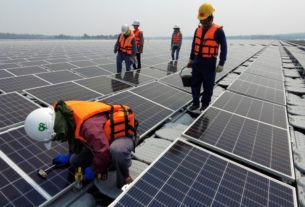Activists press for power plant ban
One hundred environmental activists from Nakhon Si Thammarat and Prachuap Khiri Khan yesterday demanded a formal written declaration from the government not to build power plants in their provinces.
“We want to see a document issued by the government saying you will not build any power plants in our homes.
Otherwise, we’ll ask for local activists nationwide to join us in protests,” said Kornuma Pongnoi, the group leader, who successfully led protests to scrap the Hin Krut and Bo Nok power projects in those two provinces in 2002.
“If you think it is essential to build new power plants, let’s do it in your backyard, or do it in your headquarters, but here in our hometowns no one wants them,” Ms Kornuma told a public hearing in
“If you still want to build the plants, I will ask other activists in other provinces who have similar views to join us. I would say none of the provinces in this country want power plants in their neighbourhoods.”
The protesters also demand the government scrap all plans for nuclear and coal-fired power plant development and emphasise renewable energy instead.
“We chose to join this seminar because we want to announce to the public that the current power development plan should be reviewed,” said Ms Kornuma.
“We want the government to remove coal-fired and nuclear power plants from the 2010 PDP (power development plan), particularly in the South of Thailand,” said Prayuth Wannaprom, another leader of the group.
The seminar organised by
Speakers at the event included senior officials from the Energy Ministry, the Energy Planning and Policy Office (Eppo) and the Electricity Generating Authority of Thailand (Egat), along with activist Senator Rosana Tositrakul.
“The government has not put enough effort into demand-side management.
If they encourage people to consume less power, there’s no reason to build new power capacity,” said Mrs Rosana.
She also criticised PTT Plc, the majority state-owned energy conglomerate, saying it did not want to operate its sixth gas separation plant because of the cheap fixed selling prices of liquefied petroleum gas, resulting in the need for huge amounts of imported LPG.
She also reiterated a claim she has made frequently that petrol in
Egat has tentatively selected areas for nuclear and coal-fired power plants and started to narrow down its site selection process, with two provinces included on the list.
Mr Prayuth said after the seminar ended that his group needed to protest before any related contracts could be signed.
“Renewable energy is the best choice in the development of the power sector.
Even though renewable power is costly, I’d rather pay a higher power bill than use cheap fossil fuel,” he said.
Eppo’s coal and nuclear power plants would be subject to environmental – and health – impact assessments under Section 67 of the Constitution.
“If Thai people don’t want power plants, [economic] development could not be possible either. The law gives our rights protection,” said Samerjai Suksumek, the director of Eppo’s power policy bureau.
He said energy policymakers had put a lot of effort into developing renewable energy in parallel with extensive energy-saving campaigns.
“The power sector is at high risk in relying too much on natural gas, as we have limited gas resources, so we need to balance resources for energy security.
But if you don’t want it, who dares to force you [to accept power plants]?”
Source: http://www.bangkokpost.com
